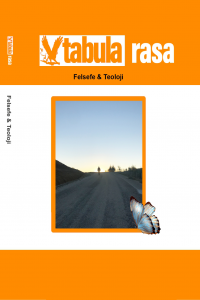Thomas Kuhn ve Bilimin Doğası: Fen Eğitimi ve Bilim Felsefesi Açısından Bir İnceleme
Bilimin Doğası, Fen Eğitimi, Thomas Kuhn, Bilim Felsefesi, Paradigma, Nature of Science, Science Education, Philosophy of Science, Paradigm
Thomas Kuhn and the Nature of Science: A Perspective from Science Education and Philosophy of Science
Thomas Kuhn, Nature of Science, Science Education, Philosophy of Science, Paradigm,
___
- Abd-El-Khalick, F. (1998). The influence of history of science courses on students’ conceptions of the nature of science. Unpublished Doctoral Dissertation, Oregon State University.
- American Association for the Advancement of Science (1989). Science for all Americans: Summary, Washington, D.C: AAAS.
- American Association for the Advancement of Science (1993). Benchmarks for scientific literacy. Oxford University Press.
- Bailey, R. (2006). Science, normal science and science education: Thomas Kuhn and education. Learning for Democracy, 2(2), 7-20.
- Caldwell, B. (1980). Positivist philosophy of science and the methodology of economics. Journal of Economic issues, 14(1), 53-76.
- Carnap, R. (1936). Testability and meaning. Philosophy of science, 3(4), 419-471.
- Çakıcı, Y. (2009). Fen eğitiminde bir önkoşul: Bilimin doğasını anlama. Marmara Üniversitesi Atatürk Eğitim Fakültesi Eğitim Bilimleri Dergisi, 29(29), 57-74.
- Dewey, J. (1910). Science as Subject-Matter and as Method, Science 31, 121–127.
- Duschl, R. A., & Grandy, R. (2013). Two views about explicitly teaching nature of science. Science & Education, 22(9), 2109-2139.
- Duschl, R. A., & Grandy, R. (2013). Two views about explicitly teaching nature of science. Science & Education, 22(9), 2109-2139.
- Feyerabend, Paul (1975). Against Method. New Left Books
- Hodson, D. (2014). Nature of science in the science curriculum: Origin, development, implications and shifting emphases. In International handbook of research in history, philosophy and science teaching (pp. 911-970). Springer.
- Irzik, G. ve Nola, R. (2014). New Directions for Nature of Science Research. In International Handbook of Research in History, Philosophy and Science Teaching (pp. 999-1021). Springer.
- Kuhn, T. (1957) The Copernican Revolution: Planetary Astronomy in the Development of the Western Thought. Harvard University Press.
- Kuhn, T. (1962). The Structure of Scientific Revolutions. University of Chicago Press.
- Kuhn, T. (1970). The Structure of Scientific Revolutions. University of Chicago Press.
- Kuhn, T. (1977). The Essential Tension: Selected Studies in Scientific Tradition and Change. University of Chicago Press.
- Kuhn, T. (1992a). “Keşfin Mantığı mı Yoksa Araştırmanın Psikolojisi mi?.” Bilginin Gelişimi & Bilginin Gelişimiyle İlgili Teorilerin Eleştirisi içinde, (s. 1-29). Paradigma Yayınları.
- Kuhn, T. (1992b). Eleştirmenlerime Cevaplar. Bilginin Gelişimi & Bilginin Gelişimiyle İlgili Teorilerin Eleştirisi içinde (s. 284-342). Paradigma Yayınları.
- Kuhn, T. (2017). Bilimsel Devrimlerin Yapısı. (Çev. N. Kuyaş). 9. Baskı. Kırmızı Yayınları.
- Kuhn, T. (1994). Asal gerilim: Bilimsel gelenek ve değişim üzerine seçme incelemeler. Kabalcı.
- Laudan, L. (1983). The demise of the demarcation problem. In Physics, philosophy and psychoanalysis (pp. 111-127). Springer.
- Lederman, N. G. (1992). Students’ and teachers’ conceptions of the nature of science: A review of the research. Journal of Research in Science Teaching, 29, 331-359.
- Lederman, N.G., Lederman, J.S., & Antink, A. (2013). Nature of science and scientific inquiry as contexts for the learning of science and achievement of scientific literacy. International Journal of Education in Mathematics, Science and Technology, 1(3), 138-147.
- Loving, C. C., & Cobern, W. W. (2000). Invoking Thomas Kuhn: What citation analysis reveals about science education. Science & Education, 9(1), 187-206.
- Mach, E. (1886). ‘On Instruction in the Classics and the Sciences’, in his Popular Scientific Lectures (pp. 338–374), Open Court Publishing Company.
- Masterman, M. (1970). The Nature of a Paradigm. In Criticism and the Growth of Knowledge (pp. 59-90). Cambridge University Press.
- National Research Council (2000). Inquiry and the national science education standards: A guide for teaching and learning. National Academy Press.
- Niaz, M. (2009). Critical appraisal of physical science as a human enterprise: Dynamics of scientific progress. Springer
- Rorty, R. (1979). Philosophy and the Mirror of Nature. Princeton University Press.
- Sarı, M. A. (2017). Mantıkçı Pozitivizmden Sofistike Yanlışlamacılığa Sınır Çizme Sorununun Kavranışı, Beytulhikme: An International Journal of Philosophy, 7(1): 1-21.
- Ünal, Ş. M. & Sarı, M. A. (2021). Bilimde Keşif ve Gerekçelendirme Bağlamı Ayrımı Tartışmaları. Tabula Rasa: Felsefe ve Teoloji, (36), 27-38.
- Verein Ernst Mach. (1929). The Scientific World-Conception. The Vienna Circle. Wissenschaftliche Weltauffassung. Der Wiener Kreis, 299-318.
- Wellington, J. (2001). What is science education for?, Canadian Journal of Science, Mathematics and Technology Education, 1(1), 23-38.
- Yardımcı, A. B. (2019). Thomas Kuhn’un Paradigma Kavramı ve Rölativizm Tartışması. Uluslararası 30 Ağustos Bilimsel Araştırmalar Sempozyumu içinde (s. 4-9). İksad Yayınevi.
- Yardımcı, A. B. (2021). Kuram Seçimi, Eksik Belirlenim ve Thomas Kuhn. In İ. Şiriner & M. Aydın (Eds.), Global Agenda in Social Sciences (pp. 307-314). Ijopec Publication.
- ISSN: 1302-8898
- Yayın Aralığı: Yılda 2 Sayı
- Başlangıç: 2001
- Yayıncı: Mevlüt ALBAYRAK
Mevlana’nın Alanlararası Genişleme Üzerinden Erdem Çözümlemesi
Türk Kültüründe Çevre Algısı ve İslam’ın Türk Toplumunun Çevre Anlayışına Etkileri
Hasan KALYONCU, Kemaleddin TAŞ
Henri Poincare’in Bilim Anlayışı Çerçevesinde Bilimin Yapısı ve Değerine Yönelik Görüşleri
Mehmet Ali SARI, Alper Bilgehan YARDIMCI
Thomas Kuhn ve Bilimin Doğası: Fen Eğitimi ve Bilim Felsefesi Açısından Bir İnceleme
